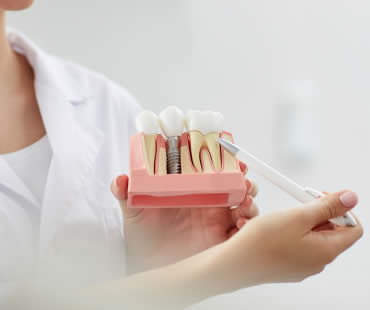
Jun 9, 2023 | Dental Topics 3, Implant Dentistry, Blog
Failure to take good care of your teeth can result in tooth loss, and so can issues like trauma or aging. No matter why you lose a tooth or multiple teeth, you’ll want a secure, comfortable and attractive replacement. Dental implants come to the rescue with all of these benefits and more.
A dental implant involves placing a titanium rod into your jaw to provide a sturdy new root, and then topping it off with an artificial tooth. You’ll end up with a fully functional tooth that works, looks, and feels just like a natural tooth.
There are a number of advantages that dental implants bring:
- prevents movement of neighboring teeth
- does not negatively impact adjacent teeth
- looks aesthetically appealing
- does not slip or move in any way
- provides comfortable fit
- lasts a lifetime with proper care
- requires no special maintenance
Dental implants are inserted surgically while you are under local anesthesia, so you won’t feel anything during the procedure. There may be minor swelling or minimal pain that can be managed by over-the-counter remedies, and those side effects should dissipate within a couple of days. Risks are low and the long-term results are very good. The implant fuses with your body and you won’t even know it’s there once it has healed.
Ongoing care for your dental implant simply involves regular brushing and flossing, and dental checkups to ensure continued good oral health. You should be able to expect your fully restored smile to look and feel great for years to come.
Our dental office is located in Conyers

Mar 4, 2022 | Dental Topics 3, Implant Dentistry, Blog
If you have lost a tooth due to injury, disease, or decay, you may be wondering what your options are for restoration. The best, long-term solution for restoring your single missing tooth is a dental implant fitted with a crown. A single tooth dental implant replaces both the natural tooth, as well as the tooth’s root.
A dental implant allows you to replace a missing tooth without altering the state of surrounding teeth. Common alternative treatments, such as the placement of a tooth-supported bridge, require neighboring teeth to be filed or cut down into peg shapes to support the appliance. Those compromised teeth are more susceptible to decay and bone loss. However, dental implants do not require such alterations, thus preserving the healthy teeth. The placement of an implant involves placing a small titanium post into the jawbone, which provides an anchor for the placement of the implant. This artificial “root” attaches to the bone and gums to become a base for a crown.
You may be tempted to avoid restoring one missing tooth; however, leaving it untreated can result in bone loss, altered chewing capability, and an overall unappealing appearance to your smile. For these reasons, it would be wise to consider an individual dental implant to replace your single missing tooth. With proper oral hygiene and regular dental care, single tooth implants can last as long as 25 years. Schedule a consultation with your dental professional to determine if you are a good candidate for a single tooth dental implant to replace your missing tooth and restore your healthy smile.
We look forward to seeing you in our Conyers dental office

Oct 14, 2022 | Dental Topics 3, Implant Dentistry, Blog
Dental implants are a fantastic solution for replacing missing teeth. Choosing a qualified, experienced and knowledgeable dental professional to place the implants is a vitally important step that could mean the difference between a successful or failed implant procedure. Properly placed and cared for implants can last a lifetime, but improperly placed implants have the potential for problems or even complete failure. Some things to consider when selecting an implant dentist include:
- Is the dentist a board-certified implant specialist? Any dentist can legally place implants. You should specifically look for a dentist with a specialty in “Prosthodontics” as recognized by the American Dental Association.
- How long has the dentist been placing implants and how many implant procedures have been done? The ideal implant dentist will have placed hundreds of implants, and should perform this procedure on a regular basis.
- What is the dentist’s specific training in implant surgery? A qualified implant dentist should have completed more than just a weekend course in dental implant placement, and should be able to show that knowledge is maintained with continuing education.
- Can the dentist provide before and after photos of previous implant patients? You should be able to see the dentist’s own work, not stock photos. The dentist should also be able to provide you with recommendations from former patients.
- Can the dentist explain the different types of implants and how each might suit your needs? A qualified and experienced implant dentist will have used an array of implant types and be able to recommend the best option to meet your specific restoration needs.
Making a choice of a qualified implant dentist is a critical part of the dental implant process, with a goal of ensuring success. Take your time and make certain the dentist you select has the experience and knowledge to make your implant placement worry-free.
If you need a dentist in Conyers contact us today

Jan 11, 2024 | Dental Topics 3, Implant Dentistry, Blog
More and more patients with missing teeth are taking advantage of the popular restoration method of dental implants. If you are considering implants, you might have some questions or concerns. It may sound like a daunting procedure that might scare you off, but getting the facts will likely ease your fears.
We offer Dental Implants in Conyers
How will I know about the process?
Seeking treatment from a qualified, experienced, reputable dentist is the first step in the dental implant process. If you and your dentist decide together that implants are a good solution for you, dental X-rays will be taken to get a clear picture of your bite and exactly where the dental implant should be placed. With the appropriate data and information needed, your dentist will create a treatment plan for accurately inserting the implant during oral surgery and later placing a crown on top to complete the restoration. These initial steps in the process will help avoid complications during the implant procedure.
Does it hurt?
If pain is what’s making you hesitate about getting dental implants, the good news is that there is practically no pain during the procedure. You will remain comfortable during treatment thanks to simple anesthesia injections in the area. Although you may notice vibrations during implant placement, actual pain shouldn’t occur. Anti-anxiety medications are sometimes given to calm a patient’s nerves, and sedation dentistry is an option for those with more serious dental fears.
What about recovery?
Most patients experience minimal pain after dental implant surgery. Soreness is normal, similar to what you’d expect after getting a filling, but over-the-counter medication like ibuprofen is usually sufficient. Dentists sometimes prescribe an antibiotic or a mouth rinse to reduce infection risks during healing. With the advancements made in dentistry, there is no reason to shy away from dental implants. Make a dental appointment in our Conyers office to learn more about them today.

Jun 26, 2025 | Dental Topics 3, Implant Dentistry, Blog
Treatment with dental implants has proven to be highly predictable, with success rates in the range of 95%. However, if you are considering the placement of dental implants, you may still want reassurance about the safety of implants and the surgical procedure.
Dental implants are utilized to replace missing or damaged teeth. The implant acts in place of the natural root and supports restorations such as crowns, bridges, or removable dentures. Once implants have been placed, the patient enjoys the benefit of an appliance that looks and feels like natural teeth. Dental implant surgery is performed with the patient under local or IV sedation. The implant takes approximately four to six months to fuse to the jawbone, at which time your permanent restorations can be put into place.
We offer Dental Implants in Conyers
In the past implants have been known to shrink the bone surrounding the implants over the course of time. However, newer implant technology has eliminated this risk almost completely. Implants also do not damage the surrounding teeth during preparation.
Titanium is the most common material for dental implants. This type of metal is known for outstanding resistance to corrosion, as well as being highly compatible with the environment within the mouth. While allergic reactions to titanium are possible, it is known to be extremely rare.
The best insurance you can give yourself regarding implant safety is to take time and care when choosing your oral surgeon. A highly skilled and experienced doctor will be better prepared about how to avoid or treat potential complications. A good oral surgeon will take great care in the planning stages of your implant surgery to avoid the possibility of implant failure.
Once your surgery is complete, it is vitally important to follow all the post-operative and aftercare recommendations your oral surgeon provides. Do not skip or postpone your follow-up visits, and maintain excellent oral hygiene to ensure you will escape any potential risks or complications and enjoy the benefits of dental implants for many years.

Mar 24, 2023 | Dental Topics 3, Teeth Whitening, Blog
Have you ever wondered if your smile could be brighter? Have you considered teeth whitening, but just aren’t sure if it’s appropriate for you? People are born with different shades of teeth, but over time, other factors can affect the color of the enamel. The color of your teeth may have changed due to the following:
- Pigment-rich food and beverages such as cola, wine, juice, berries, candy, and ketchup are just several examples of foods that may darken your teeth.
- Cigarette smoking and chewing tobacco are known to cause yellowing of teeth.
- Certain medications can result in tooth darkening. These offenders include some antibiotics, high blood pressures medicines, antipsychotic drugs and certain antihistamines.
- Chemotherapy or radiation treatments can cause teeth to change colors.
- Enamel wears away as you age, and teeth acquire a build-up of tartar and stains that darken your teeth.
- Excessive fluoride use either from your water, fluoride supplements, toothpaste or rinses can cause teeth to yellow.
- Trauma caused by a fall or blow to the mouth can damage nerves and cause teeth to permanently brown or blacken.
- Poor oral hygiene or avoiding regular dental care can cause teeth to turn unwelcome colors.
While some of these causes may make whitening more difficult, talk to a qualified dentist in Conyers about the best option for meeting your whitening goals. The general rule of thumb is for your teeth to closely match the shade of the whites of your eyes. Teeth that are too white will look unnatural, so if you choose professional whitening, you should consult with your dental professional about how to achieve the most natural result. In cooperation with your dentist, making the decision to undergo professional teeth whitening could mean you will soon be facing the world with a brighter, whiter smile.
If you live in the Conyers area contact us today








